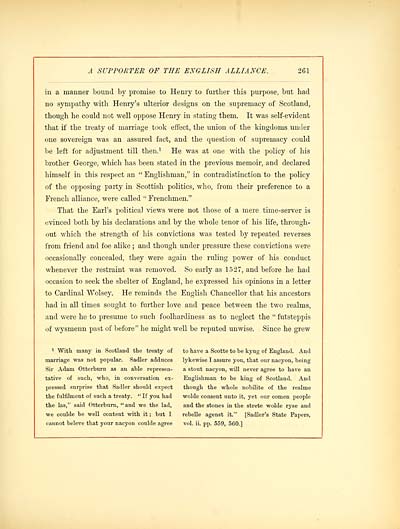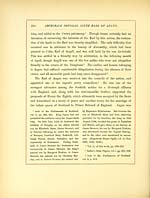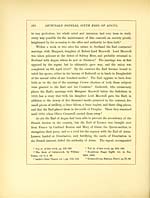Douglas book > Angus memoirs
(285) Page 261
Download files
Complete book:
Individual page:
Thumbnail gallery: Grid view | List view

A SUPPORTER OF THE ENGLISH ALLIANCE. 261
in a manner bound by promise to Henry to further this purpose, but had
no sympathy with Henry's ulterior designs on the supremacy of Scotland,
though he could not well oppose Henry in stating them. It was self-evident
that if the treaty of marriage took effect, the union of the kingdoms under
one sovereign was an assured fact, and the question of supremacy could
be left for adjustment till then. 1 He was at one with the policy of his
brother George, which has been stated in the previous memoir, and declared
himself in this respect an " Englishman," in contradistinction to the policy
of the opposing party in Scottish politics, who, from their preference to a
French alliance, were called " Frenchmen."
That the Earl's political views were not those of a mere time-server is
evinced both by his declarations and by the whole tenor of his life, through-
out which the strength of his convictions was tested by repeated reverses
from friend and foe alike ; and though under pressure these convictions were
occasionally concealed, they were again the ruling power of his conduct
whenever the restraint was removed. So early as 1527, and before he had
occasion to seek the shelter of England, he expressed his opinions in a letter
to Cardinal Wolsey. He reminds the English Chancellor that his ancestors
had in all times sought to further love and peace between the two realms,
and were he to presume to such foolhardiness as to neglect the " futsteppis
of wysmenn past of before" he might well be reputed unwise. Since he grew
1 With many in Scotland the treaty of to have a Scotte to be kyng of England. And
marriage was not popular. Sadler adduces lykewise I assure you, that our nacyon, being
Sir Adam Otterburn as an able represen- a stout nacyon, 'will never agree to have an
tative of such, who, in conversation ex- Englishman to be king of Scotland. And
pressed surprise that Sadler should expect though the whole nobilite of the realme
the fulfilment of such a treaty. " If you had wolde consent unto it, yet our comen people
the las," said Otterburn, "and we the lad, and the stones in the strete wolde ryse and
we coulde be well content with it ; but I rebelle agenst it." [Sadler's State Papers,
cannot beleve that your nacyon coulde agree vol. ii. pp. 559, 560.]
in a manner bound by promise to Henry to further this purpose, but had
no sympathy with Henry's ulterior designs on the supremacy of Scotland,
though he could not well oppose Henry in stating them. It was self-evident
that if the treaty of marriage took effect, the union of the kingdoms under
one sovereign was an assured fact, and the question of supremacy could
be left for adjustment till then. 1 He was at one with the policy of his
brother George, which has been stated in the previous memoir, and declared
himself in this respect an " Englishman," in contradistinction to the policy
of the opposing party in Scottish politics, who, from their preference to a
French alliance, were called " Frenchmen."
That the Earl's political views were not those of a mere time-server is
evinced both by his declarations and by the whole tenor of his life, through-
out which the strength of his convictions was tested by repeated reverses
from friend and foe alike ; and though under pressure these convictions were
occasionally concealed, they were again the ruling power of his conduct
whenever the restraint was removed. So early as 1527, and before he had
occasion to seek the shelter of England, he expressed his opinions in a letter
to Cardinal Wolsey. He reminds the English Chancellor that his ancestors
had in all times sought to further love and peace between the two realms,
and were he to presume to such foolhardiness as to neglect the " futsteppis
of wysmenn past of before" he might well be reputed unwise. Since he grew
1 With many in Scotland the treaty of to have a Scotte to be kyng of England. And
marriage was not popular. Sadler adduces lykewise I assure you, that our nacyon, being
Sir Adam Otterburn as an able represen- a stout nacyon, 'will never agree to have an
tative of such, who, in conversation ex- Englishman to be king of Scotland. And
pressed surprise that Sadler should expect though the whole nobilite of the realme
the fulfilment of such a treaty. " If you had wolde consent unto it, yet our comen people
the las," said Otterburn, "and we the lad, and the stones in the strete wolde ryse and
we coulde be well content with it ; but I rebelle agenst it." [Sadler's State Papers,
cannot beleve that your nacyon coulde agree vol. ii. pp. 559, 560.]
Set display mode to:
![]() Universal Viewer |
Universal Viewer | ![]() Mirador |
Large image | Transcription
Mirador |
Large image | Transcription
Images and transcriptions on this page, including medium image downloads, may be used under the Creative Commons Attribution 4.0 International Licence unless otherwise stated. ![]()
| Histories of Scottish families > Douglas book > Angus memoirs > (285) Page 261 |
|---|
| Permanent URL | https://digital.nls.uk/96535214 |
|---|
| Attribution and copyright: |
|
|---|---|
| Description | A selection of almost 400 printed items relating to the history of Scottish families, mostly dating from the 19th and early 20th centuries. Includes memoirs, genealogies and clan histories, with a few produced by emigrant families. The earliest family history goes back to AD 916. |
|---|

